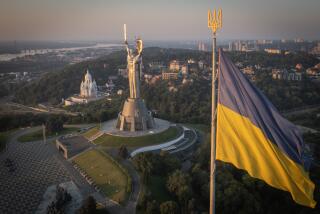Arabs Try to Forge United Front for Peace Conference : Mideast: Foreign ministers and PLO envoys gather in Syria to debate strategy and policies.
DAMASCUS, Syria — Arab foreign ministers gathered Wednesday to debate strategy on the eve of their first face-to-face talks with Israel, including Syria’s controversial call for them to boycott talks on water, arms control and the environment until the Israelis begin to meet demands for withdrawing from occupied Arab lands.
Huddling in a plush hotel conference room, foreign ministers of Jordan, Syria, Egypt and Lebanon and representatives of the Palestinian Liberation Organization met with envoys from Saudi Arabia and Morocco. They are seeking to guarantee a united Arab front that would permit no separate deals similar to the peace treaty that Egypt signed with Israel in 1979.
The outcome of the talks here could influence the direction of the Middle East peace conference next Wednesday in Madrid. The move of Arab states toward normalizing relations with Israel by way of the regional talks has been viewed as a key part of U.S. Secretary of State James A. Baker III’s “confidence building” strategy and an important factor in Israeli cooperation on other issues.
Syria and the PLO have argued that it is pointless to begin friendly talks with Israel while it still occupies the Golan Heights, the West Bank and Gaza Strip.
In talks here that broke the ice after years of chilly relations between Syria and the PLO, Syrian President Hafez Assad and PLO Chairman Yasser Arafat also agreed that issues such as a halt to Jewish settlement-building in the occupied territories and the future status of Jerusalem should be dealt with in the first round of talks.
Syrian Foreign Minister Farouk Shareh announced last week that Syria will attend the ceremonial opening session in Madrid and subsequent direct talks with Israel. But he said it would boycott a third round of region-wide talks on issues such as arms control, economics, water and the environment “until the conference produces concrete and tangible results.”
“Isn’t that logical? Isn’t that sensible?” the English-language Syrian Times editorialized this week. “How could the problems of the region be examined and discussed while the parties concerned are still in a state of war?”
Analysts here said Syria may have picked a fight it cannot win. Close U.S. allies in the region, including Saudi Arabia, Egypt, Morocco and perhaps even Jordan, are likely to oppose the move. Also, the PLO is just as worried that any one of the Arab nations, including Syria, might be tempted to conclude a comfortable deal with the Israelis before the most difficult issue, the Israeli occupation of Palestinian lands, is resolved.
“You see, this is the first time since 1948 that any of them have ever held face-to-face talks,” explained one delegate. “They are tense. You know? Tense. They don’t know what will happen. Their populations at home wonder if the Israelis are to be trusted. So each one, if he goes, he wants to be sure that his brother will go with him.”
Conference sources said the most important issues to be worked out involve strategy--ensuring that separate deals are not made and developing mechanics for communicating among delegations once individual talks with Israel begin.
An Egyptian official said Wednesday that although there may be disagreements over details, “all of us are in agreement on the one principle, land for peace. There is no question on that matter.”
One big question mark still is the attitude taken by the six Persian Gulf states, attending the conference as observers. Israel has long sought normalized relations with the Gulf states, including an end to the Arab economic boycott of Israel. But Saudi Arabia’s foreign minister, Prince Saud al Faisal, was noncommittal Wednesday.
“We are here to discuss that. As the GCC (Gulf Cooperation Council), we would be involved in such a conference, and we are here to discuss that,” he told reporters after nearly six hours of talks that concluded without any agreements and were scheduled to resume this morning.
The Syrians and the Palestinians are pressing for a full-scale summit of participating Arab countries should the foreign ministers’ talks fail to reach an agreement.
On Tuesday, Iran and radical Mideast groups allied with it closed a separate conference in Tehran with promises to continue attacks on Israel and with threats against any Arab party that makes deals with the Jewish state, news services reported. The conference also condemned next week’s peace talks.
Among the groups represented in Tehran were Hamas, a radical Muslim Palestinian group active in the occupied territories; Hezbollah, a fundamentalist Shiite Muslim group in Lebanon, and Fatah Uprising, a breakaway Palestinian group.
More to Read
Sign up for Essential California
The most important California stories and recommendations in your inbox every morning.
You may occasionally receive promotional content from the Los Angeles Times.









